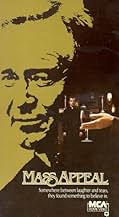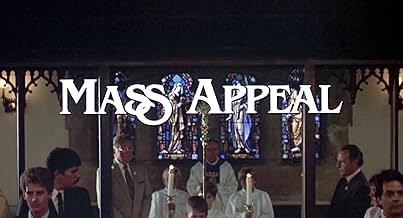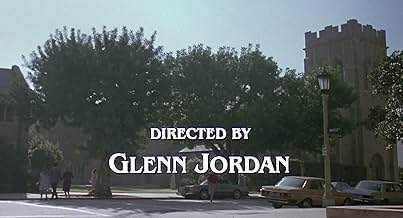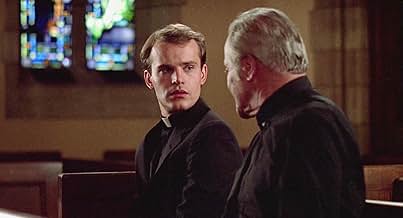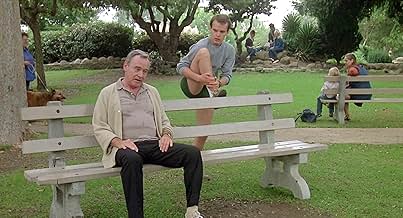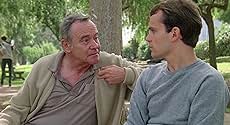IMDb RATING
6.7/10
1.2K
YOUR RATING
A popular Connecticut priest shields a seminary rebel from the wrath of a stern monsignor.A popular Connecticut priest shields a seminary rebel from the wrath of a stern monsignor.A popular Connecticut priest shields a seminary rebel from the wrath of a stern monsignor.
- Awards
- 1 win total
Featured reviews
The Catholic Church is as much, if not more, political than it is spiritual. As a young Catholic boy considering the priesthood yet conflicted between my own feelings and myself and that which the Church demanded, in the end I decided to go to high school instead of entering the Seminary.
I saw this movie as a young lay man. There was such a resonance for me as a Catholic and as a young man struggling with the Church, sexuality, and spirituality.
The pastor (Lemmon) was very much the pastor of a parish that was part of my experience. As much as he was devoted to his calling, he was also responsible for the political games that are played in everyone's life. The young seminarian (Ivenek) was honest, open and young with new ideas; everything the Church wanted to suppress.
The pastor wanted nothing more than to continue his comfortable position in his parish. He was assigned a new priest-to-be who had shown himself to be a bit of a radical at the seminary. It's not to be ignored the "office politics" that were in place in the assignment.
The elder was being punished and tested, so to speak, with the assignment of this younger priest. He did his best to impose his wisdom on the younger; but the younger sought spirituality more than acceptance of the status quo. In other words, he ruffled parishioners' feathers.
When complaints were lodged about this young radical priest, his sexuality came into question. What those "powers that be" were concerned about was this young priest's sermons and indictments of false spirituality dressed up as devotion. After all, if the Church had ever really been concerned with sexuality, there'd not have been a molestation of any alter boy.
This film shows how the Church picks and chooses who to persecute. Persecution of the parish priest for not playing the political games, persecution of the young seminarian who desires to spread the Word of God.
It also indicts us as parishioners. Do we go to church to be told what we want to hear or are we there to hear God's truth? Should our contributions to the collection plate influence what we hear; or should the Word of God actually mean something? This is a memorable movie in that it makes us think about what brings us to Church.
I saw this movie as a young lay man. There was such a resonance for me as a Catholic and as a young man struggling with the Church, sexuality, and spirituality.
The pastor (Lemmon) was very much the pastor of a parish that was part of my experience. As much as he was devoted to his calling, he was also responsible for the political games that are played in everyone's life. The young seminarian (Ivenek) was honest, open and young with new ideas; everything the Church wanted to suppress.
The pastor wanted nothing more than to continue his comfortable position in his parish. He was assigned a new priest-to-be who had shown himself to be a bit of a radical at the seminary. It's not to be ignored the "office politics" that were in place in the assignment.
The elder was being punished and tested, so to speak, with the assignment of this younger priest. He did his best to impose his wisdom on the younger; but the younger sought spirituality more than acceptance of the status quo. In other words, he ruffled parishioners' feathers.
When complaints were lodged about this young radical priest, his sexuality came into question. What those "powers that be" were concerned about was this young priest's sermons and indictments of false spirituality dressed up as devotion. After all, if the Church had ever really been concerned with sexuality, there'd not have been a molestation of any alter boy.
This film shows how the Church picks and chooses who to persecute. Persecution of the parish priest for not playing the political games, persecution of the young seminarian who desires to spread the Word of God.
It also indicts us as parishioners. Do we go to church to be told what we want to hear or are we there to hear God's truth? Should our contributions to the collection plate influence what we hear; or should the Word of God actually mean something? This is a memorable movie in that it makes us think about what brings us to Church.
Last night we showed `Mass Appeal' at our parish's monthly Movie Night - REEL Conversations. There was a mixed reaction from the viewers and some lively discussion afterwards.
Some questioned why Hollywood has trouble portraying Catholics (priests, monsignors, laity) in a positive light. We had difficulty coming up with a movie that showed a believer acting like a true believer. In this film, for example, in times of crisis or need, the characters don't turn to prayer for God's help. Seemed odd.
We very much enjoyed the dialog between the mentor priest and young seminarian. It was interesting to see the roles of the two alternate throughout the movie. Plenty of still-pertinent topics they covered (authority of the church, power, homosexuality, celibacy, sin, being lukewarm in one's faith) with some very interesting outcomes.
All in all, an enjoyable film with moments of great humor and warm sentiment. A fine choice for a group discussion. One that challenges your faith and is encouraging to those who believe.
Some questioned why Hollywood has trouble portraying Catholics (priests, monsignors, laity) in a positive light. We had difficulty coming up with a movie that showed a believer acting like a true believer. In this film, for example, in times of crisis or need, the characters don't turn to prayer for God's help. Seemed odd.
We very much enjoyed the dialog between the mentor priest and young seminarian. It was interesting to see the roles of the two alternate throughout the movie. Plenty of still-pertinent topics they covered (authority of the church, power, homosexuality, celibacy, sin, being lukewarm in one's faith) with some very interesting outcomes.
All in all, an enjoyable film with moments of great humor and warm sentiment. A fine choice for a group discussion. One that challenges your faith and is encouraging to those who believe.
Mark Dolson (Zeljko Ivanek) wants to be a priest because, as a child, someone boiled his goldfish. The alternate version is as uninspired - because he does not find fulfillment in intimate relationships with either sex, he is qualified for the priesthood. At any rate, he says that he wants `to help people.' A bit of a loose cannon, Dolson is sent by the Monsignor to serve as deacon for the now jaded Father Farley (Jack Lemmon).
What ever his faults may be, Dolson is impassioned. He wants to make a difference. The problem is that it is unclear as to whether the priesthood is the place for him to do it. As a vehicle for exploring the question of gays (or women for that matter) in the Roman Catholic priesthood, Mass Appeal is lacking because of this lack of clarity.
His lack of a clear `call' is foregrounded by his lackluster attempts at sermons. All Mark knows is that he wants to move people. He is uncertain about where his congregation is, or where he wants to move them. Farley steps in to suggest that he go for beloved. Hence the play on words in the title. Farley wants Mark to gain Mass Appeal by making the Mass appealing: if someone finds God in the process, hey that's ok too. Dolson will have none of this and founders.
Farley's appeal is that he knows the system. One gets the impression that he wants someone to rock the boat. Of course the irony of the situation is that in order to shake up the system, one must first join it.
Does this film have a meaning or a message? Well yeah, it does. But that is something for each viewer to figure out for him or herself. It won't make you hate or love the church (any church this one just happens to be Roman Catholic). Did I like the film? Yes. Is it my favorite? No not even close. It is a study of idiosyncrasies and harmless little lies (`I didn't know there was such a thing,' says Dolan). Jack Lemmon is in it for goodness sake, what else could you want?
What ever his faults may be, Dolson is impassioned. He wants to make a difference. The problem is that it is unclear as to whether the priesthood is the place for him to do it. As a vehicle for exploring the question of gays (or women for that matter) in the Roman Catholic priesthood, Mass Appeal is lacking because of this lack of clarity.
His lack of a clear `call' is foregrounded by his lackluster attempts at sermons. All Mark knows is that he wants to move people. He is uncertain about where his congregation is, or where he wants to move them. Farley steps in to suggest that he go for beloved. Hence the play on words in the title. Farley wants Mark to gain Mass Appeal by making the Mass appealing: if someone finds God in the process, hey that's ok too. Dolson will have none of this and founders.
Farley's appeal is that he knows the system. One gets the impression that he wants someone to rock the boat. Of course the irony of the situation is that in order to shake up the system, one must first join it.
Does this film have a meaning or a message? Well yeah, it does. But that is something for each viewer to figure out for him or herself. It won't make you hate or love the church (any church this one just happens to be Roman Catholic). Did I like the film? Yes. Is it my favorite? No not even close. It is a study of idiosyncrasies and harmless little lies (`I didn't know there was such a thing,' says Dolan). Jack Lemmon is in it for goodness sake, what else could you want?
"Mass Appeal" is enjoyable on several levels. It works as an examination of the depth of contemporary religious beliefs and their current role in our society, as an indictment of an inflexible system (the Catholic church), and as a comment on the travails of two very different men (ostensibly of the same "cloth") seeking spiritual happiness. Unfortunately, as a "mass appeal" film, not all of the issues are satisfactorily handled, but the film is entertaining nonetheless. Greg Cundiff's excellent review neatly summarizes some key plot issues and holes. For example, I found Ivanek's/Dolson's devotion and desire compelling, but what on earth would make him think that a parish of strangers would listen to his excoriations and then embrace him as their pastor? I agree with Cundiff that the lack of clarity surrounding this fundamental plot point does not help the film. I was also disappointed that Durning's character was unambiguously drawn as the heavy. A more balanced approach may have helped here. Farley's attempt at leading a discussion of the role of women priests is unusually framed, but ultimately leaves the viewer desiring a more compelling resolution to the issue.
Strongly on the plus side, Lemmon is an excellent choice for the lead (whi ch allows him to display his comic and dramatic talents equally). Farley's story is as compelling as Dolson's, and Lemmon squeezes every drop of drama from the script. His final "mass appeal" is quite affecting. Ivanek is intense as Dolson, but Charles Durning's role could be played by anyone. The film is nicely "shot" and has an exhilarating soundtrack at points.
A "7" out of "10."
Strongly on the plus side, Lemmon is an excellent choice for the lead (whi ch allows him to display his comic and dramatic talents equally). Farley's story is as compelling as Dolson's, and Lemmon squeezes every drop of drama from the script. His final "mass appeal" is quite affecting. Ivanek is intense as Dolson, but Charles Durning's role could be played by anyone. The film is nicely "shot" and has an exhilarating soundtrack at points.
A "7" out of "10."
I consider this film to be a real little gem -- unlike the original Broadway production. Its premises ring true and the ensemble acting is superb. Lemmon and Ivanek are extremely well matched as lost or submerged parts of the other in this cautionary tale about mainstream religion straining at the limits of its ability to accommodate and hold accountable truths found in the "wider" world. Lemmon's performance, especially, is artless and memorable, avoiding sentimentality and undue predictability. It is most unfortunate that in the days after Lemmon's death that no reviewer of his oeurve decided to cite this film or show clips from it in describing the actor's versatility and "every-manness." It should not be missed; so compelling is the uneasy and finally transformative relationship between the two men that one is left wondering what happens to both priest and seminarian in the years that follow. Rent this of a Sunday afternoon when you're longing to experience some rising spirit.
Did you know
- TriviaAccording to actor Zeljko Ivanek, the fish sermon scene was shot 15 times from three different angles. Although Ivanek considers the last take the best, most of it didn't make the final cut because it was too emotionally jarring for the audience.
- Quotes
Father Tim Farley: You're a lunatic! And Christ NEEDS lunatics. But the trouble with lunatics is, they don't know how to survive.
- Crazy creditsThis picture is dedicated to the memory of Ray A. Kroc.
- ConnectionsFeatured in At the Movies: Dune/Starman/Mass Appeal/Runaway (1984)
- How long is Mass Appeal?Powered by Alexa
Details
- Release date
- Country of origin
- Language
- Also known as
- Mass Appeal
- Filming locations
- Claremont, California, USA(myself, as I was an extra in this film)
- Production companies
- See more company credits at IMDbPro
Box office
- Budget
- $7,000,000 (estimated)
- Gross US & Canada
- $1,945,658
- Gross worldwide
- $1,945,658
Contribute to this page
Suggest an edit or add missing content


